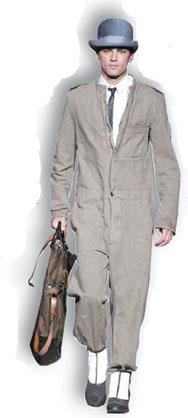Just as flush times gave traditionally staid menswear permission to loosen up, a grim economy is dictating a back-to-basics gravitas and a return to serious business attire.

Menswear, never in the vanguard of US fashion, is looking to tried-and-true staples of a good suit, shirt and shoes that signal stability, focus and solvency, say fashion experts taking stock of the collections showing at New York's Fashion Week.
"These are times that tend to homogenize fashion," says Alan Flusser, author of Dressing the Man: Mastering the Art of Permanent Fashion. In menswear, he says, that means clothes that "project a sense of importance, security and continuity".
An outfit from Diesel's Solid Gold collection.
"People want to look like they're working. You're going to see more men looking for interview-esque clothes than ever before," he says.
The collections at New York's Fashion Week bear that out. Hundreds of designers are showing both men's and women's lines at the semi-annual event that ends today.
Calvin Klein's largely monochromatic collection reflected lean times, with slim silhouettes stripped of detail. Suits, shirts and ties all rendered from the same fabric comprised single outfits.
While the mood was somewhat lightened by some futuristic molded foam sculpted pants and jackets, a bevy of proper cashmere topcoats relied on conservative fabrics like tweed, herringbone, houndstooth and a workmanlike twill.
Richard Chai's first menswear show featured gray and more gray, with a host of peacoats, military jackets and a boxy, short-waisted schoolboy jacket suggesting institutional conformity.
Hints of color like plum or mustard daubed a few shows including Spurr, but Duckie Brown's collection with industrial, military and prison influences was far more typical.
Duckie Brown's exercise in conformity included peacoats and sleekly tailored overcoats suitable for the stylized stars of television's Mad Men, set in the 1960s, variously paired with carpenter trousers in flannel or twill.
Miguel Antoinne described his collection as "a move away from casualization", with tailored militaristic looks in somber black and grays.
"It's apparent that super trendy and overdone will not be the approach for fall," says Tom Julian, a brand and trend consultant. "It's back to quality and updated classics with a modern attitude."
Designers face a gloomy recessionary landscape of tight credit, choked retail sales, job cuts and anxious consumers unwilling to spend on much more than necessities.
"The fact is, most people own enough clothes, but they've become accustomed to shopping as entertainment," says Flusser. "They can really hold off now on buying new things. Men, in particular, have enough to coast for awhile."
Related News
Photos
More>>trade
- Christopher kane 2009 A/W collection at London Fashion Week
- Berhanyer during the Pasarela Cibeles fashion week in Madrid
- Brazilian 'Underwear Day' in Brasilia
- Agatha Ruiz De La Prada F/W 2009/10 women's collection in Milan Fashion Week
- A model presents a hairdo during "Splash International 2009" in Tokyo
market
finance
- Barbie doll to celebrate its 50th anniversary Monday
- Christian Lacroix F/W 2009/10 women's collection in Paris Fashion Week
- Karl Lagerfeld F/W 2009/10 women's collection at Paris Fashion Week
- Jean-Paul Gaultier F/W 2009/10 women's collection at Paris Fashion Week
- Olivier Theyskens Collection at Paris Fashion Week





